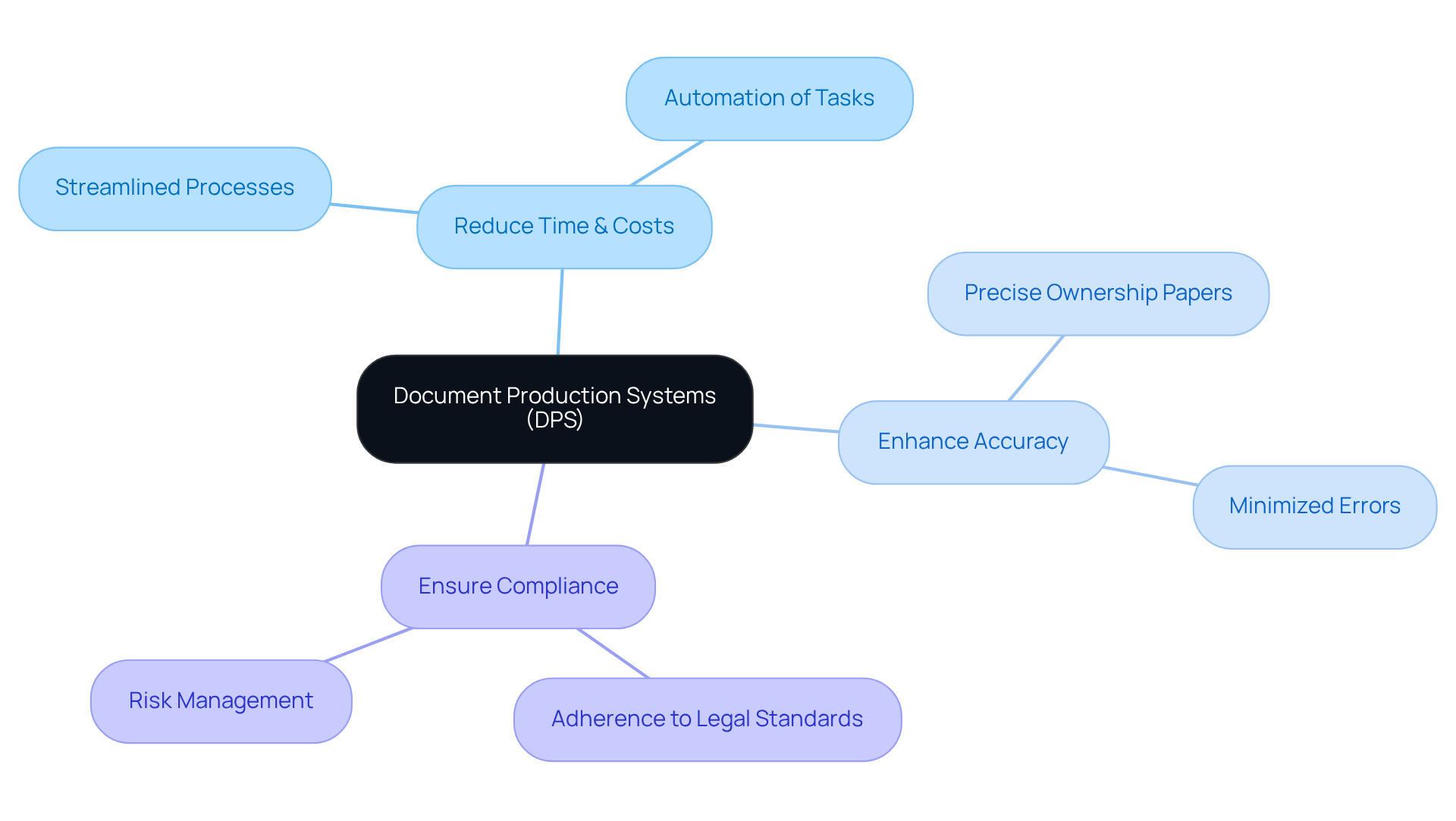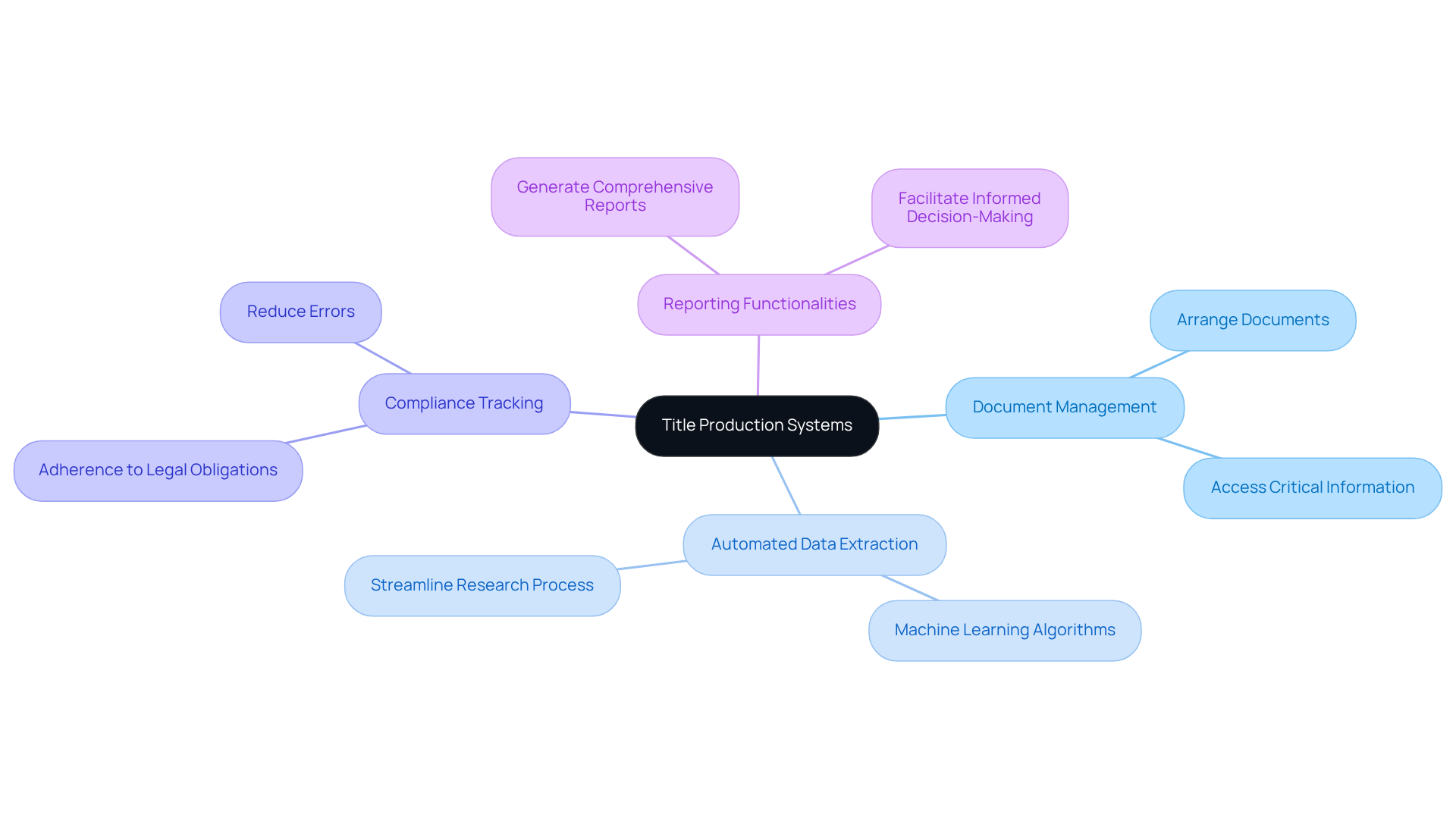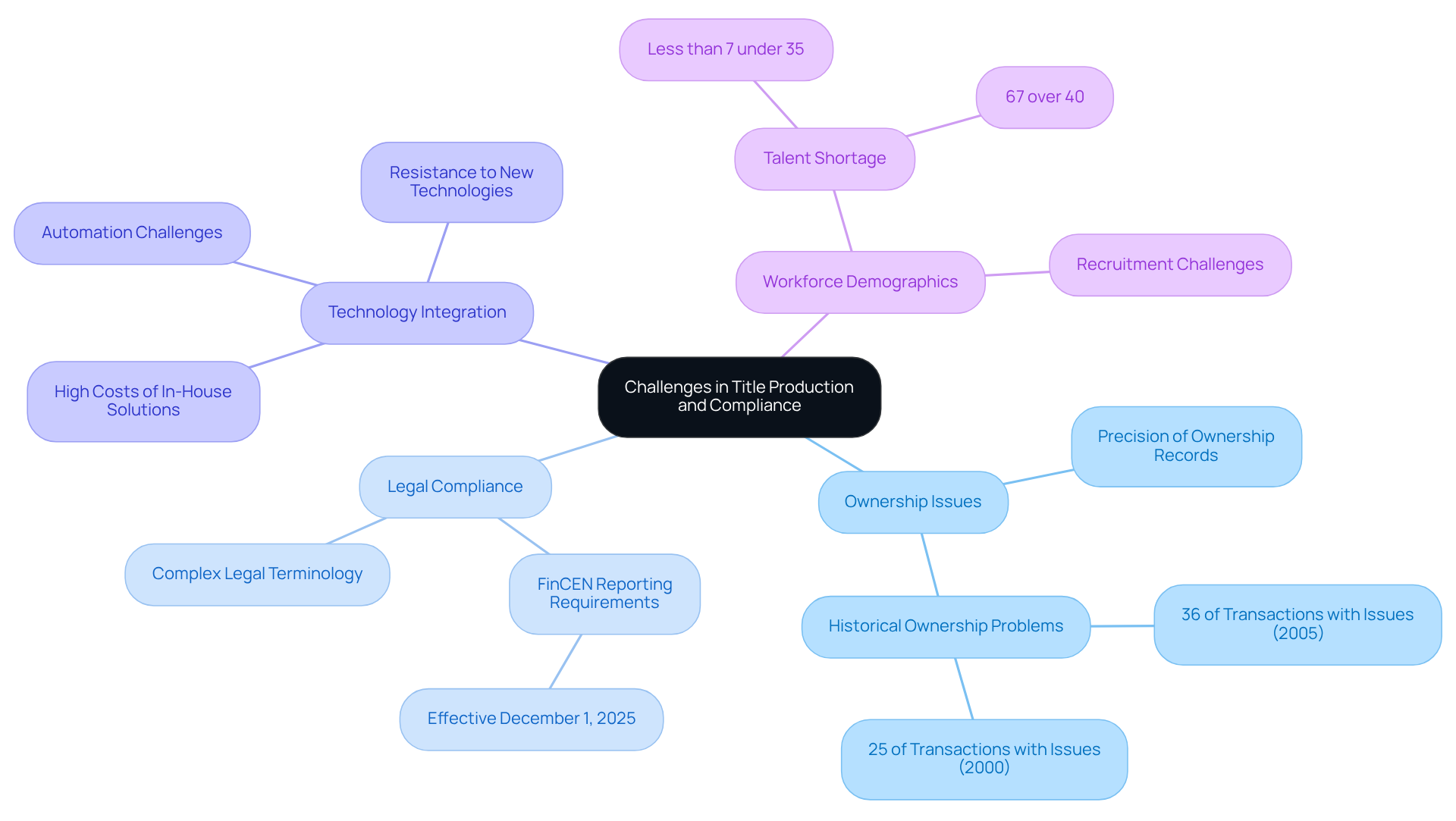Overview
The article emphasizes the essential components and challenges of title production systems, underscoring their pivotal role in improving efficiency and accuracy in property transactions. It details how technological advancements, including automated data extraction and compliance tracking, have revolutionized these systems. Furthermore, it addresses persistent challenges such as discrepancies in ownership records and the resistance to new technologies that impede their full potential.
Introduction
Document production systems (DPS) have fundamentally transformed the property sector, revolutionizing the processes of ownership research and document management. These sophisticated platforms not only enhance accuracy and efficiency but also play a vital role in ensuring compliance with legal standards. As the real estate landscape continues to evolve, new challenges emerge in maintaining precise ownership records and integrating innovative technologies.
What are the essential components of these systems?
Furthermore, how can industry professionals effectively navigate the complexities they present to maximize their operational effectiveness?
Define Title Production Systems and Their Importance
Document production systems (DPS) represent specialized software platforms meticulously crafted to streamline the intricate processes involved in ownership research, document preparation, and property verification. These systems are pivotal in the property sector, ensuring that document researchers can adeptly manage and produce precise ownership papers. The significance of DPS lies in their ability to:
- Reduce the time and costs associated with ownership research
- Enhance accuracy
- Ensure compliance with legal standards
By automating numerous tasks, DPS empowers property professionals to focus on higher-value activities, thereby significantly improving the overall efficiency of property transactions.

Trace the Evolution of Title Production Systems
The development of document production systems (TPS) can be traced back to traditional manual processes that relied heavily on paper documentation and human labor. As the property sector expanded, the demand for more effective techniques became clear. The introduction of digital record-keeping in the late 20th century marked a significant turning point, allowing for quicker access to ownership information.
Furthermore, with the advent of machine learning and optical character recognition in the 21st century, TPS have transformed into sophisticated platforms capable of automating data extraction and document generation. This evolution has not only enhanced accuracy but also significantly decreased the time needed for property research, making TPS essential tools for real estate professionals today.
Notably, statistics show that 77% of deed firms now outsource their searches, reflecting the efficiency achieved through these technological advancements. In addition, integration with third-party partners enables software to source and order necessary information for closing documents, thereby enhancing operational efficiency.
Historical case studies reveal that prior to digital systems, ownership research was often time-consuming and prone to errors, underscoring the significant benefits brought about by these innovations. For instance, Punctual Abstract has produced millions of abstracts over the past 30 years, demonstrating the practical application of these advancements in the industry.
Overall, the advancement of property research technology has provided an overview of title production systems, fundamentally transforming the landscape of real estate transactions to make it more efficient and trustworthy.

Identify Key Components and Characteristics of Title Production Systems
An overview of title production systems highlights key components that are pivotal in enhancing operational efficiency. Document management allows users to effectively arrange and access documents, ensuring that critical information is readily available. Furthermore, automated data extraction utilizes advanced machine learning algorithms to extract relevant data from extensive records, streamlining the research process. Compliance tracking is equally crucial, as it guarantees adherence to all legal obligations during research, significantly reducing the likelihood of errors. Strong reporting functionalities empower researchers to swiftly generate comprehensive reports, facilitating informed decision-making in real estate transactions. Collectively, these features enhance the efficiency and accuracy of document production, offering an overview of title production systems as indispensable in the industry.

Examine Challenges in Title Production and Compliance
Despite advancements in ownership production systems, the overview of title production systems indicates that significant challenges persist, particularly regarding the precision and completeness of ownership records. Historical data reveals that ownership issues were present in 36% of residential property dealings in 2005, a notable increase from 25% in 2000. Recent trends indicate that these issues continue, with the flourishing real estate market resulting in a rise in dealings and, consequently, ownership complications. Such inconsistencies lead to discrepancies in property ownership details, complicating the ownership research process.
Furthermore, the legal terminology contained in document headings complicates matters, often necessitating careful interpretation to ensure adherence to changing regulations, such as the forthcoming FinCEN Anti-Money Laundering Rule effective December 1, 2025, which mandates reporting for specific all-cash dealings involving legal entities or trusts.
Rande Yeager, president of the American Land Association, underscores the significance of a professional search in all real estate dealings, stating, "This clearly illustrates the importance of a professional search in all real estate transactions, whether buying a new home or refinancing an existing mortgage."
In addition, the integration of new technologies into established workflows frequently encounters resistance from professionals accustomed to traditional methods. Numerous firms in the industry grapple with high expenses related to developing in-house digital solutions, which can impede their capacity to embrace innovative technologies. A recent case study highlights that these high capital expenditures can limit the effectiveness of automation investments.
Furthermore, the sector faces a talent shortage, with less than 7% of professionals under the age of 35, which exacerbates the challenges in maintaining service quality. Tackling these challenges is crucial for providing an overview of title production systems and improving the efficiency of document production while ensuring adherence to legal standards throughout the process. By leveraging automated solutions and fostering a culture of collaboration, title professionals can better navigate these complexities and enhance overall service quality.

Conclusion
The landscape of title production systems has undergone a remarkable transformation, evolving from manual processes to sophisticated digital platforms that enhance the efficiency and accuracy of property transactions. These systems play a crucial role in the real estate sector by streamlining ownership research, document preparation, and compliance with legal standards, ultimately enabling professionals to focus on higher-value tasks.
Key points discussed include:
- The historical evolution of title production systems, highlighting the shift from traditional methods to the integration of advanced technologies such as machine learning and automated data extraction.
- Innovations that have significantly reduced the time and costs associated with ownership research while improving accuracy.
- The importance of key components such as document management, compliance tracking, and reporting functionalities, which collectively enhance operational efficiency.
As the real estate market continues to grow, addressing the challenges associated with title production is imperative. The industry must navigate issues such as:
- Ownership record discrepancies.
- Regulatory compliance.
- Resistance to technological adoption.
By embracing automation and fostering collaboration among professionals, the potential for improved service quality and efficiency in document production can be realized. Engaging with these advancements not only enhances the reliability of title production systems but also strengthens the integrity of real estate transactions, ensuring a more trustworthy and efficient property market.
Frequently Asked Questions
What are Document Production Systems (DPS)?
Document Production Systems (DPS) are specialized software platforms designed to streamline the processes involved in ownership research, document preparation, and property verification in the property sector.
Why are Document Production Systems important?
DPS are important because they help reduce the time and costs associated with ownership research, enhance accuracy, and ensure compliance with legal standards.
How do Document Production Systems improve efficiency?
By automating numerous tasks, DPS allow property professionals to focus on higher-value activities, significantly improving the overall efficiency of property transactions.




